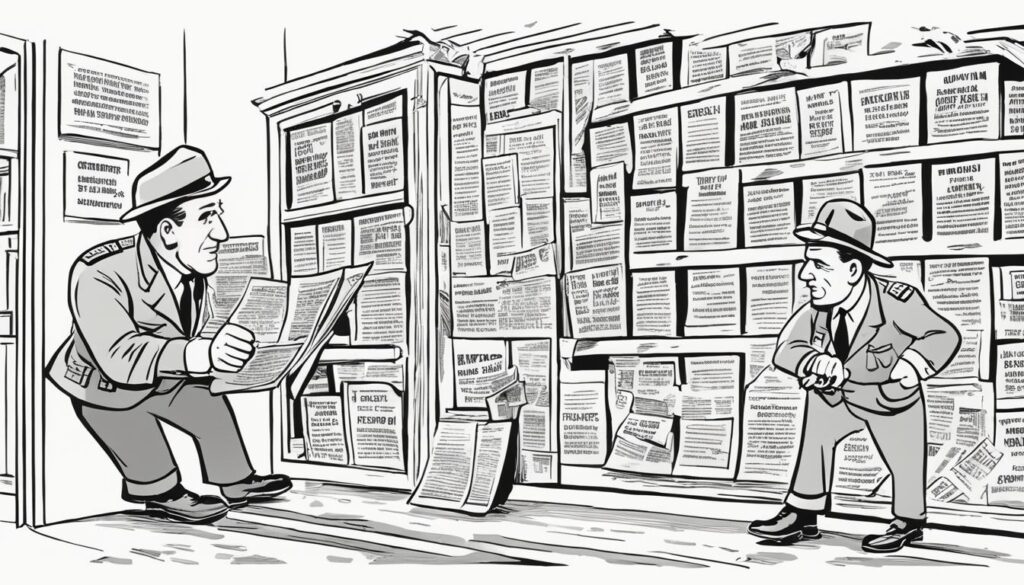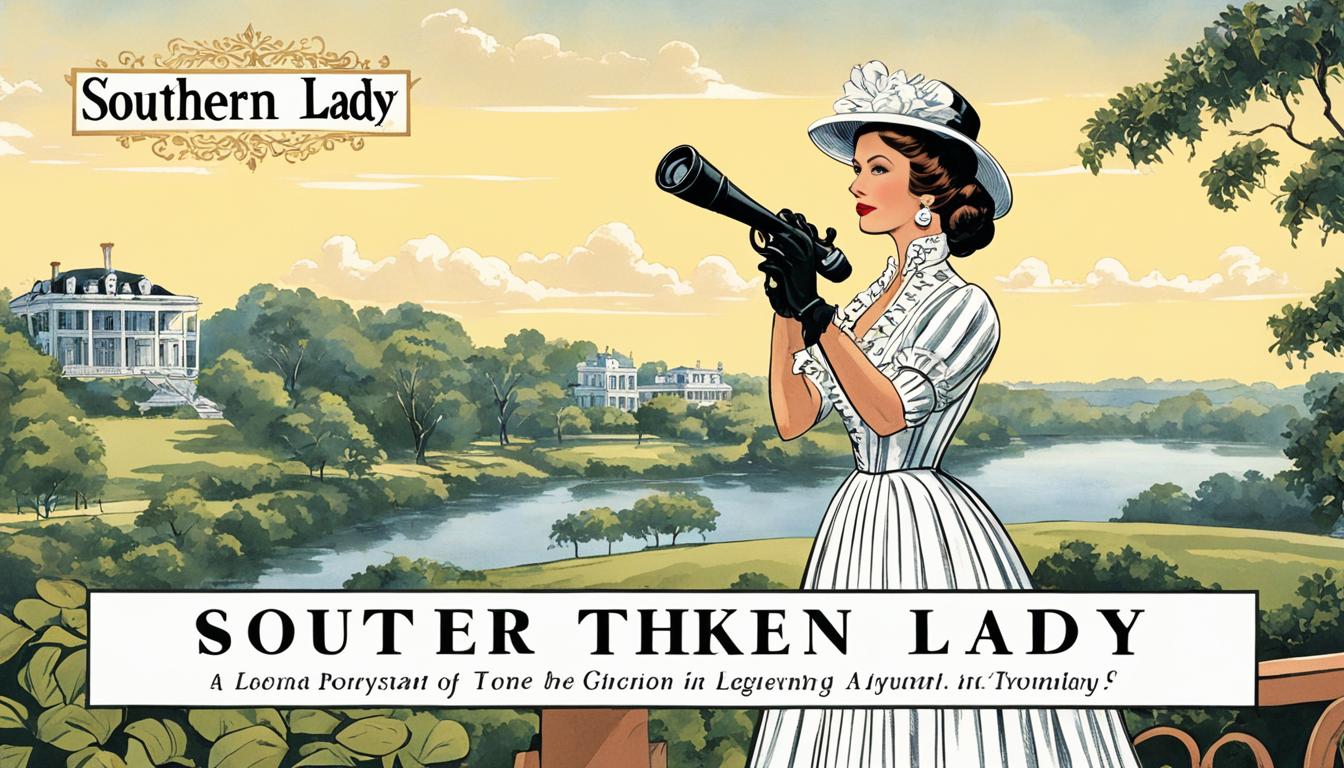‘Southern Lady, Yankee Spy’ by Elizabeth R. Varon is a captivating historical non-fiction book that delves into the world of espionage during the Civil War. The book tells the story of a Southern Belle who becomes a spy for the Union side, operating undercover behind enemy lines amidst great danger. Throughout the book, readers are taken on a thrilling journey filled with suspense, as the protagonist tries to evade pursuit by Confederate authorities while gathering intelligence.
Elizabeth R. Varon’s book provides a unique insight into the world of espionage during the Civil War, shedding light on a critical aspect of the conflict that has been largely overlooked in historical accounts. With a keen eye for detail, Varon presents a vivid portrayal of the events and characters, providing a highly engaging narrative that will keep readers on the edge of their seats.
Key Takeaways:
- ‘Southern Lady, Yankee Spy’ is a historical non-fiction book by Elizabeth R. Varon.
- The book is set during the Civil War and centers around the protagonist, a Southern Belle turned spy for the Union side.
- The book provides a unique insight into the world of espionage during the Civil War.
- Elizabeth R. Varon’s attention to historical accuracy is evident throughout the book, with a focus on primary sources.
- The book has received critical acclaim and is a must-read for fans of compelling narratives and history enthusiasts.
Introduction to ‘Southern Lady, Yankee Spy’
Elizabeth R. Varon’s ‘Southern Lady, Yankee Spy’ is a gripping historical non-fiction book that takes place during the Civil War, an era marked by espionage. The espionage activities played a significant role in the outcome of the war and reverberated long after the conflict ceased. In this section, we will discuss the importance of espionage during the Civil War and explore the genre of historical non-fiction.
As the book delves into the world of espionage, it provides an intriguing insight into a lesser-known aspect of the Civil War. Espionage was rampant, and both the Union and the Confederacy hired spies to gather intelligence and sabotage the enemy. Southern Lady, Yankee Spy offers readers a glimpse of what it was like to operate behind enemy lines and the risks and sacrifices that were involved.
The genre of historical non-fiction combines narrative storytelling with factual accuracy, providing a compelling and informative reading experience. Readers who are drawn to this genre will appreciate Elizabeth R. Varon’s meticulous research, bringing her subject matter to life.
The Importance of Espionage During the Civil War
Espionage played a crucial role in the outcome of the Civil War. Spies collected information about enemy movements and strategies, and their intelligence helped decide the war’s direction. As both sides employed espionage, it became a dangerous and complex game of cat and mouse, with spies operating in constant danger behind enemy lines. Southern Lady, Yankee Spy captures the intensity and thrill of the espionage activities during the war, offering a unique perspective on this pivotal time in history.
The Genre of Historical Non-Fiction
Historical non-fiction combines the factual accuracy of history with the compelling storytelling techniques of fiction. This genre offers readers an immersive and informative reading experience, bringing historical events to life through vivid and engaging accounts. Through careful research and accuracy, Southern Lady, Yankee Spy delivers a gripping narrative that transports readers to the Civil War era, exploring espionage and its impact on the outcome of the war.
The Protagonist: Southern Lady turned Yankee Spy
At the heart of ‘Southern Lady, Yankee Spy’ is the captivating protagonist – a Southern Belle turned spy for the Union. Elizabeth R. Varon masterfully portrays the complexities of the protagonist’s character, exploring her motivations and the personal challenges that she faces.
Driven by a strong sense of duty to her country, the protagonist undergoes a profound transformation as she works tirelessly to secure victory for the Union. Her tenacity, resourcefulness, and unwavering commitment to the cause are truly inspiring, as is her ability to navigate treacherous situations with skill and intelligence.
Despite the dangers she faces, the protagonist never loses sight of her mission, utilizing her role as a Southern lady to blend in and gather crucial intelligence for the Union. Her story serves as a powerful reminder of the pivotal role played by spies during the Civil War, and the bravery and cunning required to serve effectively in such a capacity.
Crafting a Compelling Character
Varon’s portrayal of the protagonist is both nuanced and well-developed, emphasizing her vulnerabilities and showcasing her strengths in equal measure. Through intricate characterization and vivid storytelling, the author creates a protagonist who is both relatable and heroic, a testament to the power of strong character development in historical non-fiction.
Espionage during the Civil War
During the Civil War, espionage played a vital role in the outcome of battles and the war as a whole. Intelligence gathering was key, and both the Union and Confederate sides employed various methods to gather information.
Spies were enlisted to infiltrate enemy lines, posing as civilians or soldiers to gain information on troop movements, supplies, and battle strategies. They also intercepted telegraph communications and mail to intercept messages between enemy forces.
The significance of espionage during the Civil War cannot be overstated. Information gained by spies on both sides directly influenced military maneuvers and decisions. Without the vital intelligence gathered by these undercover operatives, the outcome of the war may have been very different.
Life Behind Enemy Lines
Working undercover behind enemy lines proved to be an incredible challenge for the protagonist of ‘Southern Lady, Yankee Spy’. With a constant risk of discovery and grave consequences, her bravery and intelligence were pushed to their limits.
The dangers she encountered ranged from daily inconveniences, such as shortages of food and supplies, to life-threatening situations, such as enemy attacks and ambushes. The protagonist had to develop a keen sense of observation and intuition to stay one step ahead of the Confederate authorities.
In addition to the physical risks, the protagonist also had to grapple with moral dilemmas, such as weighing loyalty to her family against her loyalty to the Union cause.

The insights gained from the protagonist’s experiences behind enemy lines underscore the immense risks that espionage agents took during the Civil War, and the bravery required to accomplish their missions.
The Cat and Mouse Game
As the protagonist operates undercover, the Confederate authorities pursue her relentlessly, and a thrilling cat and mouse game ensues. The danger and tension escalate as she evades capture time and again, providing heart-pumping moments that will keep readers on the edge of their seats.
Impact and Significance
The actions of the protagonist in ‘Southern Lady, Yankee Spy’ played a significant role in the outcome of the Civil War. As a spy for the Union, she provided valuable intelligence that helped turn the tide of the war in favor of the north. This underscores the immense impact that espionage had on the outcome of the conflict.
Moreover, the book sheds light on the wider significance of espionage during the Civil War. It highlights how intelligence gathering was a critical aspect of the war effort, and how the use of spies became a common tactic on both sides. This demonstrates how espionage was not just an isolated phenomenon but a widespread practice that had a major impact on the course of the war.
The Role of Espionage in the Civil War
| Aspect | Union | Confederacy |
|---|---|---|
| Number of Spies | 2,000+ | More than 1,500 |
| Effectiveness | Provided critical intelligence and sabotage | Deployed successful covert operations |
| Consequences | Helped win the war | Could not overcome strategic disadvantages |
This table compares the use of espionage by the Union and Confederacy during the Civil War. It demonstrates how a relatively large number of spies were active on both sides, and how their actions had significant consequences for the war effort. The table also highlights the differing levels of effectiveness between the two sides, with the Union gaining a decisive advantage through their use of spies.
Overall, the impact and significance of espionage during the Civil War cannot be overstated. ‘Southern Lady, Yankee Spy’ provides a gripping portrayal of this highly relevant historical topic, shedding light on the role of espionage in shaping the course of one of the defining events of American history.
Historical Accuracy and Research
In ‘Southern Lady, Yankee Spy’ by Elizabeth R. Varon, historical accuracy is of paramount importance. The author’s dedication to thorough research is evident throughout the book, as she draws on a wealth of primary sources to provide an authentic portrayal of the events and characters.
Varon’s research methods included examining official records, personal letters and diaries of individuals involved in the Civil War era, and analyzing published materials from the time period. By thoroughly studying these sources, Varon was able to construct a vivid picture of the social, political, and economic landscape of the Civil War period.
Through her meticulous attention to historical accuracy and use of reliable primary sources, Varon has produced a work of historical non-fiction that brings the reader closer to understanding the people and events that shaped the Civil War era.
Critical Reception and Awards
Since its publication, ‘Southern Lady, Yankee Spy’ has received widespread critical acclaim for its fascinating exploration of espionage during the Civil War. The book has been praised for its engaging narrative, well-researched historical accuracy, and vivid portrayal of the protagonist’s experiences.
| Year | Award | Category |
|---|---|---|
| 2003 | Fletcher Pratt Award | Best Non-fiction Book |
| 2003 | Lillian Smith Book Award | Civil War, Civil Rights, and Civil Liberties |
| 2002 | Library Journal | Best History Books of the Year |
The book’s impact has been felt not only among literary circles but also among history enthusiasts, who appreciate its insightful portrayal of espionage during a pivotal moment in American history. Overall, ‘Southern Lady, Yankee Spy’ stands as a testament to the enduring power of historical non-fiction to captivate and educate readers.
Conclusion
To sum up, Elizabeth R. Varon’s ‘Southern Lady, Yankee Spy’ offers a fascinating and detailed account of espionage during the Civil War, centered around the transformation of a Southern belle turned Union spy. Through this captivating story, readers gain a deeper understanding of the significant role of intelligence gathering during this critical period in history. The book’s historical accuracy is a testament to the author’s extensive research and use of primary sources, resulting in a compelling and authentic narrative that is sure to engage history enthusiasts and fans of non-fiction alike.
In conclusion, ‘Southern Lady, Yankee Spy’ is a must-read for anyone interested in the Civil War, espionage, and the power of individual actions to shape the course of history. Its critical and commercial success is a testament to its widespread appeal and significance to the literary community.



